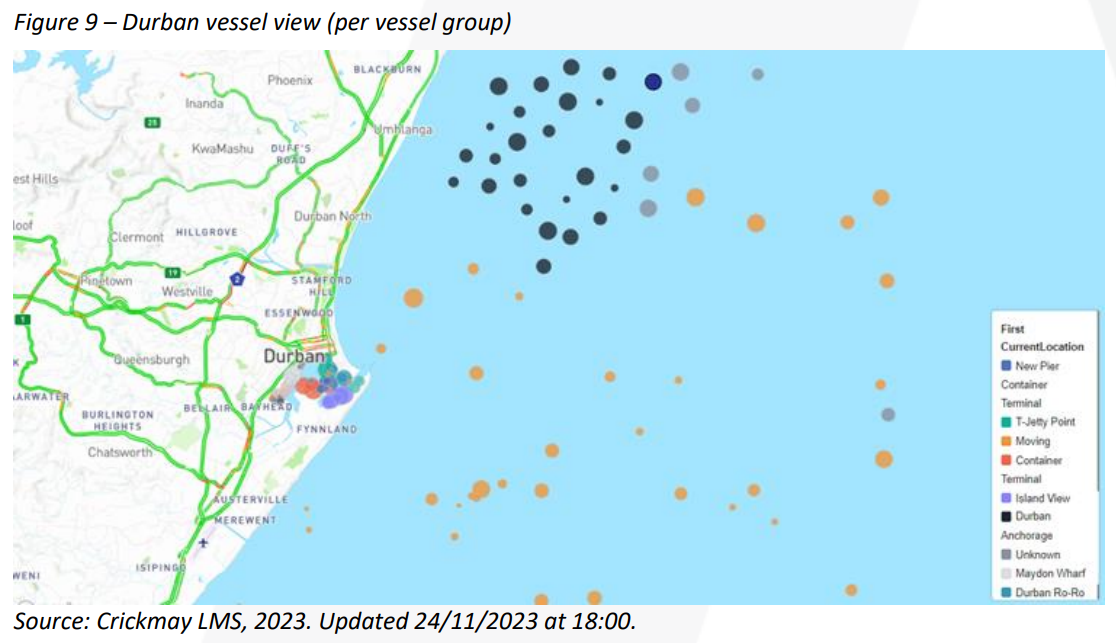[ad_1]
In one of the strongest expressions yet about the utter neglect, intransigence and lack of urgency to address the collapse of supply chain efficiencies in South Africa, the Road Freight Association (RFA) has laid into the government about the state of its logistics utility, Transnet.
With specific reference to ongoing congestion experienced at various ports on the country’s coast –especially Durban where containers of 70 000 and more are regularly delayed at anchorage for as long as three weeks, and the Richards Bay coal terminal where ore tipper queues continue to backlog north on the N2 – the RFA has said it is appalled at what’s happening.
The association’s CEO, Gavin Kelly, is especially angered by what has been described as the failure of government to act sooner.
“The current state of affairs in the ports and rail network did not ‘suddenly’ happen in the last two weeks – indeed, even Transnet is noting that specific issues at Richards Bay happened over two years ago.”
An RFA statement that includes Kelly’s rebukes, stresses that the association is “steadfast in its opinion that:
- “The deterioration of our ports and rail has been a slow, continued process over at least 10 years.
- “The management of Transnet (and its full subsidiaries) have been fully aware of the challenges, and continuously informed of these, by both structures within their respective organisations and the private sector.”
Yet despite warnings signs through the years, confirmed by South Africa’s ports slipping to the bottom of the World Bank’s Container Performance Index, “nothing was done to counter this – neither to reverse nor hold the decline.”
The RFA statement says: “The executives, management and Ministers who have ‘led’ Public Enterprises (state assets and management thereof) and the various subsidiaries of Transnet, are the ones to blame.”
Turning to the National Logistics Crisis Committee (NLCC), formed by private sector stakeholders in conjunction with the Presidency, and in which the RFA is involved in workstreams aimed at improving security and transport, the statement said there is now a real attempt to reverse decay, corruption and collapse.
“This will be a lengthy process and there is very little trust or faith left in those who allowed the collapse under their watch, to now suddenly become the ‘saviours’.
“Plans and projects are emanating from the NLCC – but the knowing concern that these are just (as in so many other instances), just talk, remains in the minds of many.
“Transport, logistics, market-related activities, running efficient and reliable supply chains and ensuring good competition to ensure growth and sustainability are the purview (ambit) of private business.
“The private sector needs to be given far more control over the failing and lethargic state-owned entities (SOE) that are throttling the economy.”
Kelly said now that the crisis of port-and-rail logistics is clear for all to see, state-owned entities are feeling the pressure and high-level efforts is made to salvage what can be saved, suddenly “short-term” plans are being put into place to “ramp up operations.
“Why wasn’t that done many years ago? A long road lies ahead of South Africa in terms of bringing ports and rail infrastructure back to a position of efficiency. We need the private sector to drive and control the nursing back to life of our vital supply chain infrastructure and nodal points.”
* Here’s the image by the South African Association of Freight Forwarders and Business Unity SA, including the data keys. The data was gathered for Saaff/Busa’s “Cargo movement update” #164, issued on November 24.

[ad_2]
Source link
